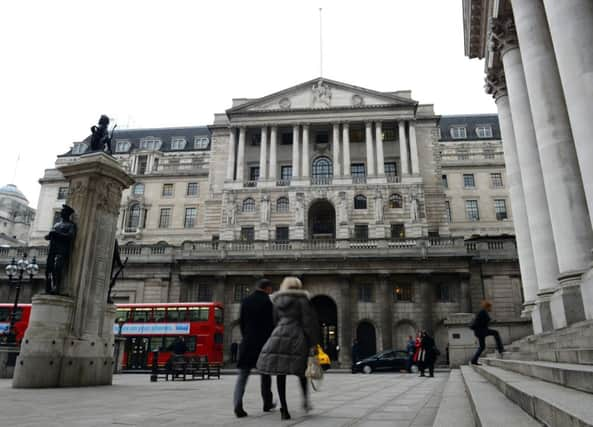Business as usual for economy ‘within months’


But while Britain’s “remarkable” fall in unemployment will result in it dropping below the 7 per cent threshold allowing the Bank of England to raise interest rates, wage levels will continue to flatline, meaning little respite in the high cost of living facing ordinary Scots, the report warns.
There are also concerns remain over “abysmal” productivity levels in the UK which still threaten to throw the recovery off track, according to think-tank the National Institute of Economic and Social Research (NIESR).
Advertisement
Hide AdAdvertisement
Hide AdThe UK economy is set to expand from 2 per cent to 2.5 per cent this year, with GDP finally returning to the pre-crisis levels seen in early 2008 in the third quarter of this year.
The NIESR forecast 2.1 per cent growth for 2015, an increase from the 1.9 per cent predicted in November last year, and 2.1 per cent for 2016.
The recovery had been fuelled by a rapid expansion in consumer spending, which was now expected to grow at its fastest rate since 2003, the NIESR said.
But that spending rise was driven mainly by a buoyant housing market rather than an increase in real wages.
Principal research fellow Simon Kirby said: “Real consumer wages are currently 8 per cent below what they were at their peak at the end of 2009. So while the UK economy is expected to pass through its pre-recession peak this year, there are still a number of years yet before we expect real consumer wages to regain their recent peak.”
Unemployment levels are expected to drop through the Bank of England’s 7 per cent threshold early this year, but an interest rate rise is not predicted until at least the second quarter of 2015.
“In the long run, rising standards of living can only occur through improved productivity,” Mr Kirby said.
“If we do not see this materialise, we may well continue to see this downward trend in real consumer wages and it does put at risk somewhat the recovery we are expecting to happen over the next few years.”
Advertisement
Hide AdAdvertisement
Hide AdExplaining why an interest rate hike was not expected even when employment dipped below 7 per cent, Mr Kirby said: “I don’t think the Bank of England is going to take a risk with a relatively weak recovery, by historical standards, for the UK and that’s why it will stay its hand.”
The NIESR said Chancellor George Osborne’s current plans would see the public finances achieve a surplus in 2018-19, but warned protecting spending for budgets such as the NHS would make that task “rather difficult”.
The world economy will grow by 3.7 per cent in 2014 and 2015, according to a separate NIESR report, an improvement on the 3.1 per cent last year.
But this remains sluggish by global standards.
Growth prospects have improved in more advanced economies, particularly in the US, but have deteriorated in a number of emerging market economies.
The Institute for Fiscal Studies has said the Chancellor faced a “huge challenge” to return to surplus by that date.